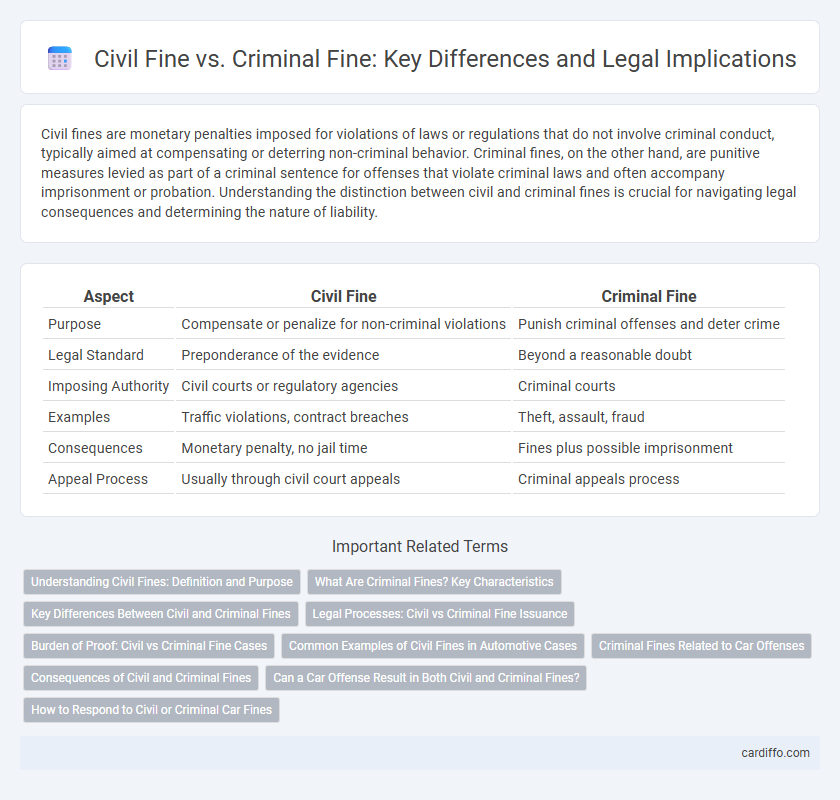Civil fines are monetary penalties imposed for violations of laws or regulations that do not involve criminal conduct, typically aimed at compensating or deterring non-criminal behavior. Criminal fines, on the other hand, are punitive measures levied as part of a criminal sentence for offenses that violate criminal laws and often accompany imprisonment or probation. Understanding the distinction between civil and criminal fines is crucial for navigating legal consequences and determining the nature of liability.
Table of Comparison
| Aspect | Civil Fine | Criminal Fine |
|---|---|---|
| Purpose | Compensate or penalize for non-criminal violations | Punish criminal offenses and deter crime |
| Legal Standard | Preponderance of the evidence | Beyond a reasonable doubt |
| Imposing Authority | Civil courts or regulatory agencies | Criminal courts |
| Examples | Traffic violations, contract breaches | Theft, assault, fraud |
| Consequences | Monetary penalty, no jail time | Fines plus possible imprisonment |
| Appeal Process | Usually through civil court appeals | Criminal appeals process |
Understanding Civil Fines: Definition and Purpose
Civil fines are monetary penalties imposed to enforce regulations and compensate for violations without involving criminal charges. Their primary purpose is to deter non-compliance with laws related to areas such as environmental protection, consumer rights, and business practices. Unlike criminal fines, civil fines do not result in imprisonment but aim to uphold legal standards through financial accountability.
What Are Criminal Fines? Key Characteristics
Criminal fines are monetary penalties imposed by the government as punishment for violating criminal laws, often resulting from convictions in criminal courts. These fines serve as a deterrent against unlawful behavior and are typically accompanied by other sanctions such as imprisonment or probation. The amount of a criminal fine varies depending on the severity of the offense, statutory guidelines, and jurisdictional rules, emphasizing its punitive and corrective nature.
Key Differences Between Civil and Criminal Fines
Civil fines are monetary penalties imposed for violations of civil laws, often involving disputes between individuals or organizations, and typically aim to compensate the injured party or enforce regulatory compliance. Criminal fines, by contrast, are punitive sanctions imposed by courts following a criminal conviction, intended to punish unlawful behavior and deter future offenses. Civil fines generally arise from cases like traffic infractions or contract breaches, while criminal fines relate to offenses such as theft, assault, or fraud.
Legal Processes: Civil vs Criminal Fine Issuance
Civil fines are typically imposed through administrative or civil court proceedings where the burden of proof is a preponderance of the evidence. Criminal fines involve formal criminal prosecution requiring proof beyond a reasonable doubt and are often accompanied by other penalties such as imprisonment. The legal process for civil fines is generally faster and less complex than the criminal process, emphasizing restitution and compliance rather than punishment.
Burden of Proof: Civil vs Criminal Fine Cases
In civil fine cases, the burden of proof requires a "preponderance of the evidence," meaning it is more likely than not that the violation occurred, which is a lower threshold compared to criminal fines. Criminal fine cases demand proof "beyond a reasonable doubt," ensuring the evidence leaves no reasonable uncertainty about the defendant's guilt. This significant difference in the burden of proof impacts the likelihood of conviction and the severity of penalties in civil versus criminal fine cases.
Common Examples of Civil Fines in Automotive Cases
Common examples of civil fines in automotive cases include penalties for parking violations, speeding tickets, and failure to display proper registration. These fines are typically imposed by local authorities and do not result in criminal records but require payment to avoid additional fees or vehicle impoundment. Civil fines also arise from non-compliance with safety inspections and emission standards, ensuring adherence to regulatory requirements without criminal prosecution.
Criminal Fines Related to Car Offenses
Criminal fines related to car offenses often result from serious violations such as driving under the influence (DUI), reckless driving, or vehicular manslaughter, carrying significantly higher penalties than civil fines. These fines serve both punitive and deterrent purposes, sometimes accompanied by additional consequences like license suspension or imprisonment. The monetary amounts vary by jurisdiction but commonly range from several hundred to thousands of dollars, reflecting the severity of the offense.
Consequences of Civil and Criminal Fines
Civil fines primarily result in financial penalties intended to compensate for harm or enforce regulations without criminal sanctions, often impacting credit scores and leading to asset liens if unpaid. Criminal fines are imposed as part of a criminal sentence, accompanied by potential imprisonment, probation, or a criminal record, which can significantly affect future employment and civil rights. Failure to pay either type of fine may escalate legal consequences, but criminal fines typically carry more severe repercussions due to their association with criminal offenses.
Can a Car Offense Result in Both Civil and Criminal Fines?
A car offense can result in both civil and criminal fines depending on the severity and nature of the violation. Civil fines typically arise from traffic infractions such as speeding or parking violations, while criminal fines occur in more serious offenses like DUI or reckless driving. Courts may impose civil penalties for regulatory breaches alongside criminal sanctions if the conduct endangers public safety or violates criminal statutes.
How to Respond to Civil or Criminal Car Fines
Responding to car fines requires understanding the nature of the penalty; civil fines typically involve paying the amount or disputing through a traffic tribunal, while criminal fines may require legal representation due to possible court appearances and criminal records. Timely actions such as reviewing the fine notice, gathering evidence like dashcam footage, and adhering to deadlines for payment or appeals are crucial in both civil and criminal cases. Consulting a traffic attorney can ensure the correct procedure is followed and may help mitigate penalties or avoid further legal consequences.
Civil Fine vs Criminal Fine Infographic

 cardiffo.com
cardiffo.com